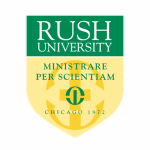Janine Gauthier, PhD, Rush University Cancer Integrative Medicine
Cancer care at Rush thrives on the close integration of patient care and innovative research designed to move quickly from the laboratory bench to the bedside. For patients at risk for lung cancer, low-dose computerized tomography (LDCT) offers the opportunity to screen for the presence of early stage tumors on the lungs. While this is a major advance in screening options, it presents significant challenges to physicians who face tough diagnosis and treatment decisions. LDCT scans are expensive, cannot distinguish benign from cancerous nodules, and, through excessive radiation exposure, may actually increase the cancer risk for patients requiring regular screening.
A simple and cost-effective blood test being developed in the laboratory of Dr. Jeffrey Borgia and his colleagues at the Rush Thoracic-Oncology Research Group has the potential to address these challenges and serve as an effective complement to CT scanning. In even the earliest stages of lung cancer, tumors release specific molecules into the blood that differ from those shed by benign nodules. These molecules can range from circulating factors that help regulate tissue metabolism to components of an unsuccessful immune response to the tumor. Dr. Borgia’s team has devised a way to use these molecules to identify a fingerprint that gives important information about each patient’s condition to the physician, ideally allowing for a more timely and accurate diagnosis.
For patients, the benefits are clear. Those with a family history of lung cancer or who are deemed high risk can be evaluated regularly with this blood test without prolonged exposure to radiation. Patients whose LDCT scans show indeterminate nodules can follow up with the blood test to determine if cancer is present. This allows patients who are negative for cancer to avoid invasive biopsies or unnecessary surgeries, and it is far less risky and worrisome than taking a “wait and see” approach as to whether the nodule grows.
Ongoing research also holds the promise of developing a second convenient, low-cost test that offers physicians additional information that will guide treatment and improve patient outcomes. This includes predicting whether the cancer is metastatic, where it is likely to spread, and what type of chemotherapy may benefit a particular patient. Approximately 25% of patients with a single lung tumor die of disease recurrence within five years of surgery, making this a particularly critical area for research. Dr. Borgia is devoting substantial resources to addressing this significant limitation to current diagnostics. If successful, this test will help the surgeons identify which patients may benefit from more aggressive postoperative care as a means to improve survival.
Lung cancer remains the leading cause of cancer deaths in the United States, but Dr. Borgia’s program to develop effective and inexpensive screening tests is well positioned to enable physicians to catch the disease early, treat it most effectively, and most importantly, save lives. With clinical trials on the horizon, this new tool may be just a few years away from reducing lung cancer mortality. Respond and Donate
Tags: lung cancer, Rush University, Team Draft. Changing the Face of Lung Cancer
